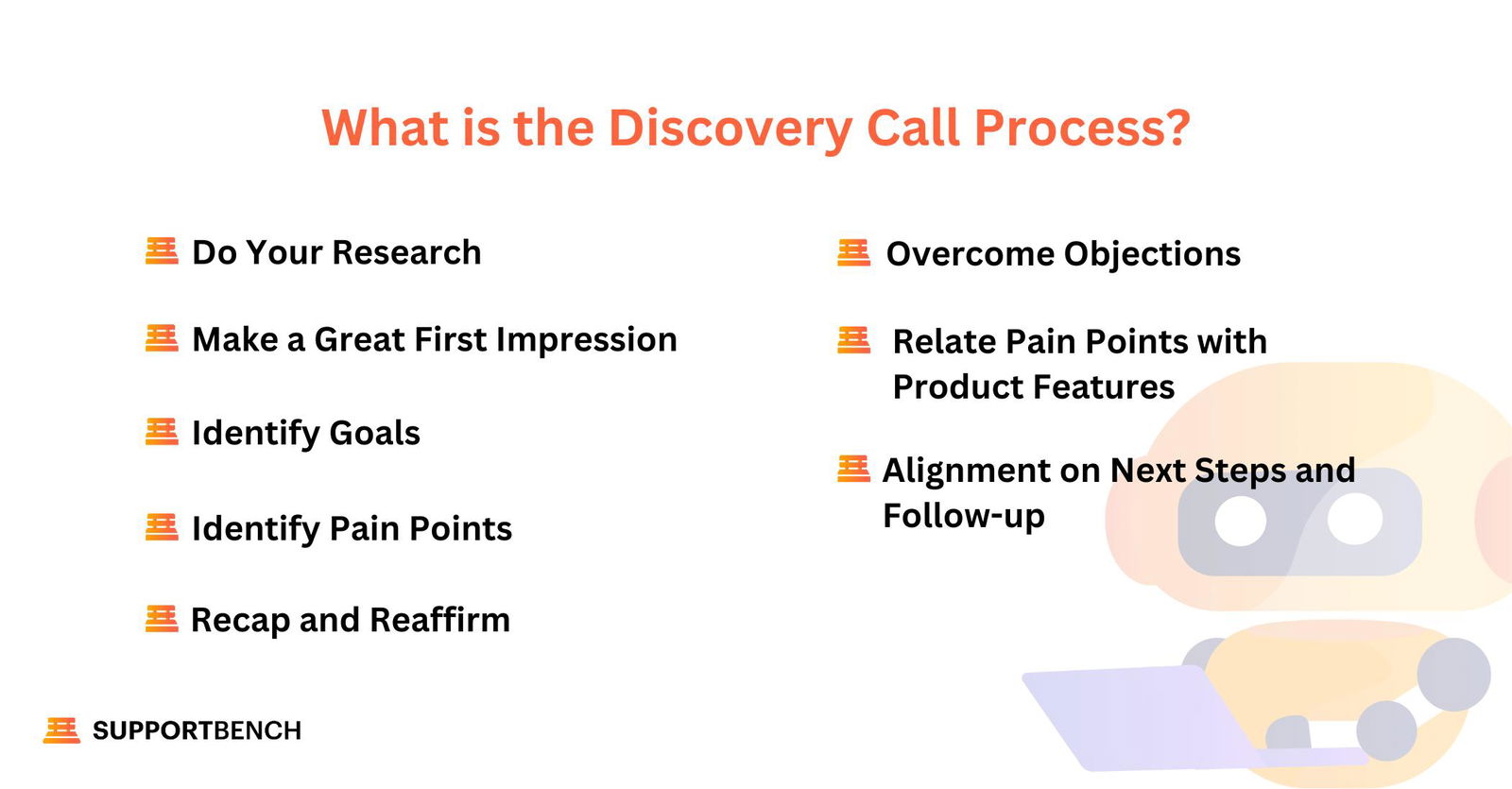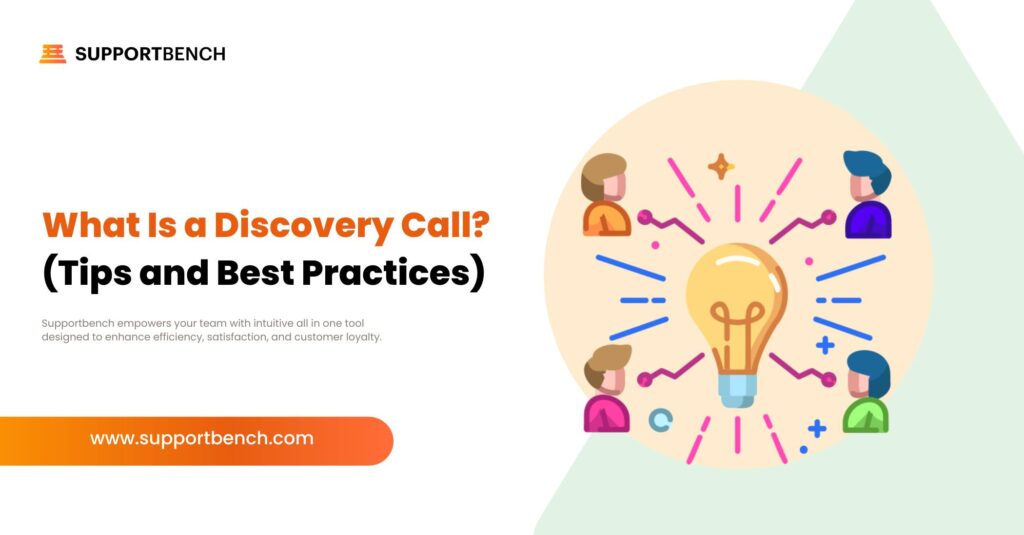A discovery call is the most essential touch point in developing a solid relationship with clients. It’s a conversation that reveals their needs, challenges, and goals, yet it also allows you to figure out how your product or service fits their needs best.
This call will set the ground needed for building trust, understanding, and further collaboration; hence, it would be more important to address this situation with the proper attitude and strategy.
Learn all you can about discovery so you’re easily able to leave a strong first impression on new leads.
What is a Discovery Call?
A discovery call is a company’s first conversation with someone interested in its products. A person can show interest by filling out a survey, asking about a product, or interacting with the company’s posts.
Discovery calls have many benefits, but their main goal is to see if the leads are a good match for the business. During these calls, the company asks questions to find out if the potential client needs its products and if they can become a long-term customer. This is an important part of sales and marketing.

Benefits of Discovery Calling
Here are some key benefits discovery calling entails:
- Understanding client’s needs
- Gathering insightful questions for unique challenges
- Informing marketing efforts with useful data
- Acting as market research for future campaigns
- Verifying potential customers and weak leads
- Converting hesitant clients
- Making a good impression on leads
- Introducing company goals and values
- Enhancing customer trust and connection
- Gathering feedback for product development
- Improving goods and services with insights
What is the Discovery Call Process?
Here’s how you can run a successful discovery call in eight steps:

Do Your Research
Do your homework on the company of the prospect and the individual LinkedIn profile before calling them. Understand their goals, challenges, and recent news. This deep preparation lets you personalize your call and show your knowledge.
Make a Great First Impression
Building rapport is crucial. Introduce yourself and your company, say your name and title, and briefly overview of the products or services provided.
Show interest in what this prospect may need; after that, listen to them and show interest in what they have to say. You can throw in some interesting case studies or even some relative statistics to highlight your expertise. But make it as relevant to this particular client as possible.
Identify Goals
Know the customer’s goals in both the short and long run. Make open-ended questions to unravel their motives and relate your product to their needs. The understanding of their aspirations will make it easy to customize your pitch in a way that shows just how your solution can help them realize those goals.
Identify Pain Points
Employ open-ended questions to understand the difficulties and problems a prospect faces and your product could solve. Listen and ask questions to know their pain points and present your solution as their best option.
Relate Pain Points with Product Features
Highlight relevant features that address the prospect’s pain points and explain how they can benefit their business. Use clear and concise language to show your product’s value and how it can help the prospect achieve their goals.
Overcome Objections
Identify potential objections and respond to them with assurance. Active listening and empathy can help in reassuring prospects.
Recap and Reaffirm
Summarize key points to ensure that what you understood is what was meant and find out what else the prospect needs to know. Recapping will also let you confirm what the prospect needs and help you uncover more questions they may have.
Alignment on Next Steps and Follow-up
Align on next steps clearly, send a personalized thank-you email, and follow up to maintain momentum. This well-timed follow-up could improve your relationship and advance the prospect much closer to a decision.

What are the Best Discovery Call Questions?
During your sales discovery calls, ask these questions:
1. How would you rate your current solution from 1 to 10?
2. What do your current processes look like?
3. How many people are on your team?
4. What are your main KPIs?
5. How long does it take to solve [the problem you address]?
6. What is your budget for solving this problem?
7. What goals is your company working towards?
8. What challenges does your company face?
9. What does success mean for your business?
10. Are you the decision-maker for this project?
11. Who else is involved in choosing a vendor?
Conclusion
The discovery call is essential for building a strong client relationship. During this call, you learn about the their needs and challenges while showing how your product or service can help them. By communicating openly and listening carefully, you create trust and understanding, which are key to long-term success.
Now, consider improving your customer interactions even more. Supportbench is a customer support platform that makes communication easier and boosts satisfaction.
With features like SLA management, multi-channel communication, and easy integration with other tools, Supportbench is a valuable resource for businesses of all sizes.
Do you want to enhance your customer interactions? Give Supportbench a free try today to learn how to improve your client relationships.
FAQs
1- What happens in a discovery call?
A discovery call aims to identify a prospect’s challenges, talk about their goals, build a connection, and decide if they are a good fit for your sales process.
2- What should you not do in a discovery call?
- Don’t talk too much! Focus on listening and asking questions instead of dominating the conversation.
- Use specific questions that relate to the prospect’s industry and business.
- Don’t assume you know what they need; ask open-ended questions to learn about their challenges and goals.
- Avoid being pushy or aggressive. Pressuring the prospect to make a decision can harm your relationship.
- Be honest about what your product can and can’t do; don’t over promise or exaggerate its abilities.
3- What are the 3 stages of discovery?
- Understand the Need
- Examine the Problem
- Uncover Solution Requirements












